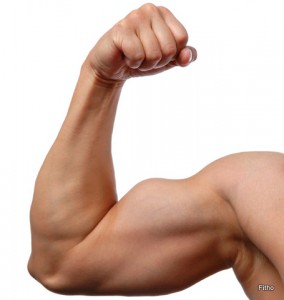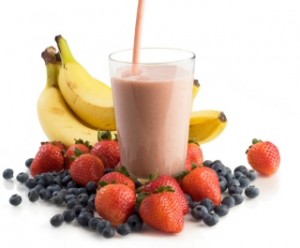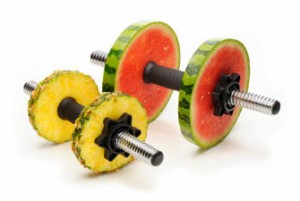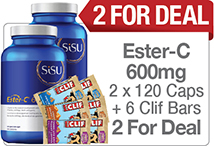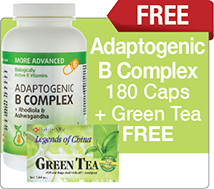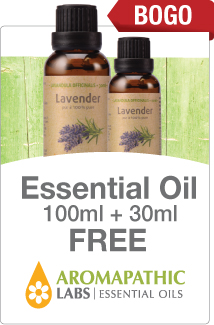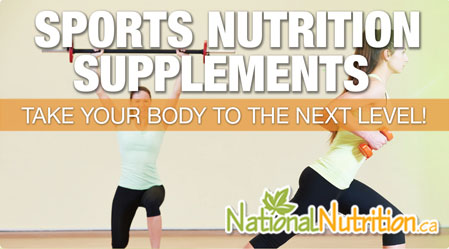
By taking creatine, proteins and numerous other supplements (along with exercise and a healthy diet) you will be one step closer to the body, strength and fitness level you want.
Sports Nutrition Supplements
Updated Nov. 25th, 2022
Sports Nutrition is an area of growing interest for athletes, and health professionals alike. It is not a topic that can be summed up easily in one article, nor generalised to all athletes. In competitive sport, countless hours and research go into calculating the specific nutritional requirements for each individual in a specific sport. These requirements are further broken down into what types of foods and supplements best supply these nutritional needs, and when they need to be consumed for optimal performance. There are teams of people dedicated to designing these ‘programs’, and there is good science behind each and every recommendation, as well as amazing results in terms of performance.
The following is meant to be a general guideline for the average individual who is sport or exercise minded, and looking to bump up their performance through diet and supplements. Nowadays, if you are a competitive athlete, or hoping to become one, there are specialised ND’s in most major cities who can develop a more individualised and goal oriented protocol.
SUPPLEMENTS
Creatine is naturally found in all organs and muscles in the body as phosphocreatine. This is the molecule responsible for the transforming adenosine diphosphate (ADP), into adenosine triphosphate (ATP). The body then uses the breakdown of ATP to release energy that is used to power all of our body processes, including muscle contraction. Creatine supplementation has been found to increase muscle strength, power and size. As a bonus, research also suggests that creatine can help to improve cognitive health and bone density in some populations.
For your Muscles
The more creatine that is available, the faster the ATP conversion occurs and the more work a muscle can do. Creatine also draws water into muscle cells making them plump up and appear larger. Studies show creatine also increases muscle strength and endurance thus enhancing athletic performance. Medically, creatine can rebuild lean tissue after periods of convalescence, muscle wasting illnesses or the natural decline in muscle tissue that occurs with age. Ultimately, creatine supplementation prior to exercise is an easy way to help boost your muscle mass and athletic performance. It is not considered doping in the professional athletic community, and is allowed by the International Olympic Committee and in professional sports.
Co-Supplementation
Creatine has been found to work well with other muscle-feeding supplements like alpha lipoic acid and carbohydrates. Because of this, a number of body building supplements will combine these factors to boost performance.
Types of Creatine
There are a number of forms of creatine currently available on the market for supplementation. The most common forms are creatine monohydrate and creatine ethyl ester (CEE). In 2009, a new form called creatine hydrocloride came on the market, which is much more soluble in water. Because of this it can be supplemented at significantly lower doses than other forms of creatine. The recommended dose of creatine depends on the condition treated. For boosting muscle and testosterone conversion, a loading dose of at least 20g daily is provided for 5-7days followed by maintenance supplementation of 5g daily.
-------------------------------------------------------------------------------------------
Glutamine is the most abundant amino acid found in the body, and it is called "non-essential" because glutamine can be biosynthesized by the body from other amino acids. Just because it is non-essential does not mean that the body cannot benefit from its supplementation. Outside of its use in sports nutrition, it is especially useful for healing the gut lining in cases of leaky gut.
Glutamine is also often used for promoting faster muscle recovery after strenuous exercise, and increased lean muscle growth. There are a number of other benefits reaped from the supplementation of glutamine.
Glutamine's Role
Glutamine is depleted by stress, physical injuries and inflammation, particularly in areas like the intestine. It promotes muscle growth (anabolism), and stops the catabolism (break down) of muscle caused by the stress hormone cortisol. Glutamine can also act as an alternative fuel source for the brain when glucose is not readily available.
Muscle Building (Anabolic)
The promotion of lean muscle mass is glutamines most well-known quality. Athletes have been using glutamine as a performance-enhancing supplement for many years. Medically, glutamine can rebuild lean tissue following periods of convalescence, surgery or after muscle wasting illnesses.
How can I take glutamine?
The biologically active and absorbable form of glutamine is L-glutamine. It is commonly found as a powder or in capsule form. Keep glutamine powder dry to prevent its degradation. It is often added to protein powders or other supplements to enhance athletic performance. The dose of L-glutamine depends on the required effect and can range from 1.5 – 12g daily.
-------------------------------------------------------------------------------------------
Branched Chain Amino Acids [BCAAs]
This group of amino acids: valine, leucine, and isoleucine are essential amino acids that contain branched side groups. They have been shown to help prevent the painful lactic acid build up during strenuous exercise that causes stiffness the morning after, also known as delayed onset muscle soreness (DOMS).
-------------------------------------------------------------------------------------------
PROTEIN
Protein is one of the most important building blocks in our bodies ...Whey, soy, rice , hemp, and peas are all great sources of protein, depending on your individual needs and sensitivities.
Protein is second most abundant substance in our body; it is second only to water. Protein makes up much of the structure of our body, including: our muscles, ligaments, tendons, bones, organs, glands, nails, and hair. It also makes up the vast majority of the molecules that allow our bodies to function and regulate itself. Protein is required for: cell signaling molecules, hormones, transport molecules and most enzymes in our bodies, including our digestive enzymes. Without sufficient protein, our bodies cannot function properly.
What is protein?
Proteins are composed of building blocks called amino acids. These subunits are linked together by peptide bonds to form chains that can be straight lines, or branched like the sub-branches on a tree. When we eat protein the body must break these peptide bonds in the digestive tract using proteases. Then single amino acids, or amino acids in short chains (called peptides), are absorbed through the gut, into the body, where they are used as building blocks to create whatever protein the body needs.
Protein Requirements
According to the Canadian Dietary Reference Intake guidelines: sedentary adult women require 46 grams of protein per day, while sedentary adult males require 56 grams to avoid deficiency. This is just the amount to prevent protein malnutrition. Athletes and individuals who are physically active at work or play will all require additional protein to repair their tissue and build more lean muscle. In general, the daily intake recommendation is between 1.5 and 2 grams of protein per kilogram of body weight for fairly active people. This is around 125g of protein per day for a 70kg (155lb) person.
Protein Powders
Protein powders can be used for many different health and performance enhancing purposes. There are a large variety of readily available protein supplements and protein processing techniques. The six main supplemental sources are: whey, hemp, soy, rice and pea, although other sources are occasionally used in some supplements. Higher quality formulas use superior processing techniques, and avoid binders, fillers, artificial flavourings and sweeteners. Be sure to check the ingredients on the label of your protein supplement.
Types of Protein Powders
Whey
This form of protein is concentrated from a byproduct of the production of cheese from cow's milk. It comes in three major forms, each of which has a different bioavailability. Whey protein, in all three forms, is the most bioavailable form of supplemental protein available. There are some cases of sensitivity to whey protein, and those who are allergic to milk should avoid its use.
Rice
Rice protein powder consists of brown rice treated with enzymes to remove the carbohydrate, leaving only the protein behind. This source of protein is vegan and hypoallergenic. Since it is lower on the food chain it is also more eco-friendly, and doesn't take such a large environmental footprint to create. Since it is naturally a little low in the amino acid lysine, rice protein is often mixed with pea protein to create a more balanced protein supplement.
Pea
Pea protein powder is created using yellow split peas. Like rice protein, pea protein is vegan and hypoallergenic, and also has a much more eco-friendly footprint. In order to balance its amino acid profile, pea protein is often mixed with rice protein to create a more balanced protein supplement.
Soy
Soy protein powder is extracted from soy beans. It is an inexpensive vegan protein that offers a complete protein source. In addition to being rich in protein, soy also contains isoflavones that act as phytoestrogens in the body. Although this makes them less than promising for body builders, this can be of great benefit to post menopausal women and others with hormone imbalances.
Hemp
Hemp protein is extracted from hemp seeds and is an eco friendly, and vegan protein source that provides all nine essential amino acids. In addition to its protein content, hemp also contains essential fatty acids (EFAs) and fibre, both of which are major ingredients in a healthy balanced diet.
A Note about Spirulina: This water-grown algae is sometimes considered a complete food. It naturally contains 60-70% protein as well as a huge number of other nutrients, vitamins and minerals. It is such a rich source of protein and B12 that it is often recommended to vegetarians to cover potential dietary gaps. It also contains chlorophyll, which helps to clear toxins from the body. For more information on spirulina, please click here.
How can I get more protein?
Protein can be ingested in the diet through a number of different sources, including: meat, dairy, eggs, nuts, legumes, tofu, spirulina, and even grains like quinoa. Protein supplements can be used for individuals who do not meet their daily protein requirement through food intake, for individuals who suffer from blood sugar fluctuations or for athletes who need to take in large amounts of protein to build muscle more quickly.
Nutritional Information
| other nutrients essential in exercise | ||
|---|---|---|
| iron | iron deficiencies are common in runners, swimmers and other endurance athletes, particularly female. needs will vary depending on level of deficiency. |
|
| magnesium | magnesium is depleted with exercise, and lost through sweat. supplementation can increase aerobic performance and muscle strength. |
|
| vitamin c | supplementation of vitamin c pre and post exercise can reduce muscle soreness. 600 mg/day. |
|
| calcium | calcium loss increases in exercise, and can eventually lead to increased risk of bone loss. supplementation is recommended in untrained athletes. up to 2000 mg/day may be necessary. speak with your healthcare professional before supplementing. |
|
| zinc | zinc is lost in sweat and urine, and is necessary to achieve optimal athletic performance. 15-30 mg/day. long term zinc supplementation also requires copper supplementation to prevent deficiencies. |
|
| chromium | can increase the action of insulin, and therefore increase the muscle building effects of weight training. 200 micrograms/day. |
|
| vitamin e | vitamin e can increase stamina and delay fatigue. 400 iu/day |
|
DIET AND LIFESTYLE
The diet that you eat every day affects what your body produces with the exercise that you do. You can spend all day in the gym, but if you don't have the diet to support your efforts, you won't get the results you seek. Muscles are the biggest energy burning cells we have in our bodies, and when they don't get sufficient food, they literally begin to break down. Muscle tissue that is worked without sufficient food will break down its own mass to create energy to burn. This is why low carb (carbohydrate) diets aren't the answer to those hoping to burn fat and build muscle.
Results in the Gym Start in the Kitchen
Carbohydrates are the fuel that muscle cells use to do their work. Protein makes the building blocks the body uses to repair damaged muscle and to build more muscle. It is important that you time your intake of these nutrients to give your muscles food to run on during exercise, and building blocks to repair themselves and grow afterwards.
Pre-workout
It is generally a good idea to eat a small snack before a workout consisting of easy to digest carbohydrates. This can be as simple as eating a piece of fruit.
It is important to warm up sufficiently prior to any exercise. This can be anything that gets your body gently moving for at least 5 minutes, such as: a light jog, jumping rope, or doing slow jumping jacks. This gives your body the time it needs to up your heart rate and promote increased blood flow to your muscles. Blood flow in the muscles is extremely important for promoting nutrient delivery and waste removal during your workout.
During Workout
If you exercise for longer than two hours, then it is beneficial to ingest simple carbohydrates (complex sugars) throughout the workout, to prevent the body from breaking down muscle, and to rebuild depleted energy reserves.
The average person hitting the gym has very little dietary requirement during their workout. It is generally not necessary to eat during a workout unless it goes on longer than 2 hours. The premise is that your pre-workout snack should cover your energy requirements for the first two hours. Unnecessarily adding the type of carbohydrate boost mentioned above during a workout can interfere with achieving a weight loss goal, and in large enough amounts, can actually promote weight gain. This includes sugary beverages, even if they claim to be "sport drinks". Excess carbohydrate ingested above and beyond that used for activity is stored as fat in the body.
Fluid intake during exercise is also important to prevent dehydration. In general, it is most beneficial to simply drink water during a workout to keep a balanced fluid level, although with more strenuous activity a gentle electrolyte solution may help to keep electrolyte levels up as well, which can reduce muscle cramping.
**Side Note** For those individuals training harder for marathons or endurance events, you should be sure to include a much higher amount of carbohydrates and protein.
Post-Workout
This is when you need to focus on hydration and protein. Protein intake will help to repair muscle, and get you ready for the next day's workout. A small amount of carbohydrate will help to restore depleted glycogen levels, and water will help to prevent muscle soreness and dehydration. For those who work out at the end of the day, make sure not to eat too much late at night, as this can interfere with sleep.
A Note about Fat
We focus a lot on carbohydrates and protein when talking sports nutrition, but we can't forget about the importance of FAT. In general, fat should make up 20 - 30% of your daily caloric intake. Healthy fats are important for health, particularly skin, hair and digestive health.
















